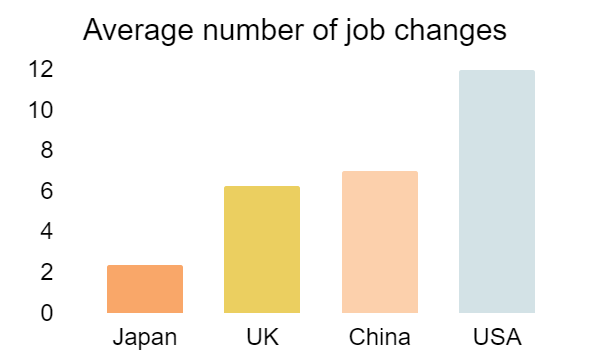Constant career changes, while becoming more common in Japan, still unfortunately holds with it a stigma of unreliability. So what are the best ways to navigate the challenge of explaining multiple career changes in an interview?
Constant career changes, while becoming more common in Japan, still unfortunately holds with it a stigma of unreliability. Having to defend against multiple career changes in an interview can be tricky and oftentimes frustrating, with candidates seemingly starting on the backfoot before they’ve even had the chance to introduce themselves.
According to a survey conducted by the Japanese Ministry of Health, Labour and Welfare in 2020, the average number of times a person changes jobs during their career is about 2.4 times. This is in stark contrast to US where the average number of jobs held by a person in the US over their lifetime is about 12 according to the United States Bureau of Labor Statistics (BLS).

Still, people are changing jobs at an increasing rate as individuals look for new challenges in their careers. Also, as social media’s reach increases, candidates have more information on the latest career opportunities with different companies.
While changing jobs regularly can help advance your career by gaining new knowledge and experience, some employers can see it negatively. Training staff and integrating them into a team is expensive and time-consuming, so companies are looking for candidates who are more likely to spend many years working for their company.So what are the best ways to navigate the challenge of explaining multiple career changes in an interview? It’s essential to address the issue in a way that is honest and positive. Here are some tips on how to handle this situation:
Be positive
Focus on the positives of each job change and avoid criticizing former employers or colleagues. Explain how the skills and experience you gained can help you excel in this new role. Try to give concrete examples of how your expertise added value in your previous position and the opportunities you see in the new role.
Highlight your adaptability
Changing jobs can be difficult. Explain how you successfully adapted to different work environments and roles. Highlight your willingness to adjust to this new role and any potential changes in responsibility in the future.
Show career progression
If your job changes were due to career advancement or seeking new challenges, make sure to highlight that in your explanation. Show how each job change has contributed to your professional growth and development. Explain how your long-term career goals link to your application to this role.

Be prepared
Expect detailed questions on your previous roles and be prepared to explain why you changed each job in a relaxed manner. For example, explain why you might have taken time off to travel, further education, or care for a family member if there are gaps in your employment. Interviewers will look for potential problems in the past which might negatively impact your performance in the new role. The more prepared you are, your answers will likely reduce their concerns.
Emphasize your commitment
Emphasize your commitment to this role and your desire to commit long-term. Demonstrating knowledge of the company and how you could add long-term value will differentiate you from other candidates.
Be honest
Finally, be open in your communication regarding previous jobs. Explain why you left each position if required in an easy-to-understand and concise manner. Honesty is vital in business, and employers understand that job changes are necessary. Starting an employment relationship from a position of openness is essential for building long-term relationships.
In summary, the key is to focus on your job changes’ positive aspects and show how each job has contributed to your professional growth and development. Demonstrate to potential employers that you are adaptable, flexible, and have a clear sense of your career goals. Finally, be well prepared, focus on understanding the interviewer’s concerns, and be calm and professional.

